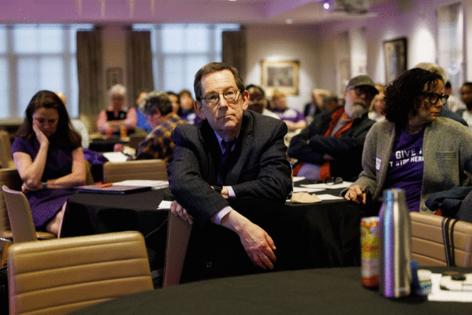Northwestern University President Michael Schill resigns amid funding freeze
Published in News & Features
CHICAGO — Northwestern University President Michael Schill announced Thursday that he will resign, concluding a three-year tenure marked by five months of an unprecedented $790 million federal funding freeze.
The school never received formal notification of the abrupt pause, which came amid several federal investigations into allegations of antisemitism. The move rattled students and faculty, and left Schill at the helm of a bitter fight between the Trump administration and elite universities across the U.S.
Northwestern, along with Schill, had already been subject to an onslaught of conservative criticism. Last spring, he was grilled for hours before a Republican-led congressional committee on the campus environment for Jewish students.
But those pressures have only mounted under President Donald Trump — who has increasingly placed higher education under fire for antisemitism and diversity, equity and inclusion practices.
In a message to the Northwestern community Thursday morning, Schill acknowledged the “difficult problems” at the federal level. He said he would remain in the role until an interim president is named.
“From the very beginning of my tenure, Northwestern faced serious and often painful challenges,” Schill said. “In the face of those challenges and the hard, but necessary choices that were before us, I was always guided by enduring values of our University: protecting students, fostering academic excellence, and defending faculty, academic freedom, due process and the integrity of the institution.”
Schill, 66, will continue to collaborate with the university’s board of trustees on efforts to restore funding, the university said. Once he steps down, he will take a sabbatical before returning as a faculty member at the Pritzker School of Law.
In the months since the funding pause, Schill and other school officials have overseen a string of belt-tightening measures. That included mass layoffs in July, which reduced Northwestern’s staff-related spending by 5%. Earlier, officials announced changes to employees’ benefits and a hiring freeze.
Those cuts sowed widespread concern among faculty, and have stalled many of the university’s research efforts. Faculty members told the Tribune in June that the school was shelling out $10 million a week to keep research afloat.
“As I reflect on the progress we have made and what lies ahead, I believe now is the right time for new leadership to guide Northwestern into its next chapter,” Schill said.
The embattled Northwestern leader is the latest university president to resign amid the wave of scrutiny on higher education. Many of those departures, like Schill, were at least indirectly driven by campus demonstrations against the war in Gaza — and the intense pressure placed on university leadership.
In 2024, Schill made national headlines for brokering a deal with pro-Palestinan protesters: In exchange for the removal of their encampment, students were allowed to continue demonstrations for several weeks. The agreement was believed to be a first for a major U.S. university.
But it also stirred outrage among some critics, who accused Schill of fostering a hostile environment for Jewish students. Schill, who has described himself as a Jewish descendant of Holocaust victims and survivors, maintained that the agreement allowed for a “de-escalated path forward.”
Weeks later, he was called to testify on Northwestern’s handling of antisemitism before the Republican-led House Committee on Education and Workforce. In the hearing, he outlined the school’s plans to update its code of conduct and better protect Jewish students.
“Where there is conduct that threatens the Northwestern community, we must impose discipline, and we have done so,” Schill told the committee. “Yet, I will be the first to admit ― our existing rules and policies are falling short, and we must improve our processes to meet the current challenge.”
Schill returned to the same House body for an interview in August, after committee Chair Tim Walberg, R-Mich., accused him of failing to uphold those commitments. The interview was closed to the press, and a spokesperson told the Tribune the transcription would not immediately be made public. The transcript was released Thursday night.
In a statement Thursday, Walberg derided Schill and urged his successor to take “effective action to protect Jewish students from the scourge of antisemitism.”
“President Schill will leave behind a legacy of not only failing to deter antisemitism on campus but worsening it,” Walberg said. “These students not only deserve better, but the law requires it.”
After similar hearings in the aftermath of campus protests, three Ivy League presidents resigned: Harvard President Claudine Gay, University of Pennsylvania President Liz Magill and Columbia University President Minouche Shafik. Gay and McGill testified before the congressional committee in December 2023, and Shafik in April 2024.
All three universities, like Northwestern, saw their federal research funding frozen by the White House this spring.
Schill was named Northwestern’s 17th president in August 2022. Previously, he was president of the University of Oregon for seven years, and was dean at the law schools of the University of Chicago and the University of California Los Angeles.
Despite recent controversies, Schill emphasized that the school is on “stronger footing.” In a news release, the university credited him with establishing new academic and research centers, and for overseeing $2.5 billion in fundraising efforts.
Under his leadership, Northwestern climbed to No. 6 in the U.S. News & World Report national rankings, the highest in university history, the release said.
“Our community has made significant progress while simultaneously facing extraordinary challenges,” Schill said. “Together, we have made decisions that strengthened the institution and helped safeguard its future.”
____
©2025 Chicago Tribune. Visit at chicagotribune.com. Distributed by Tribune Content Agency, LLC.







Comments